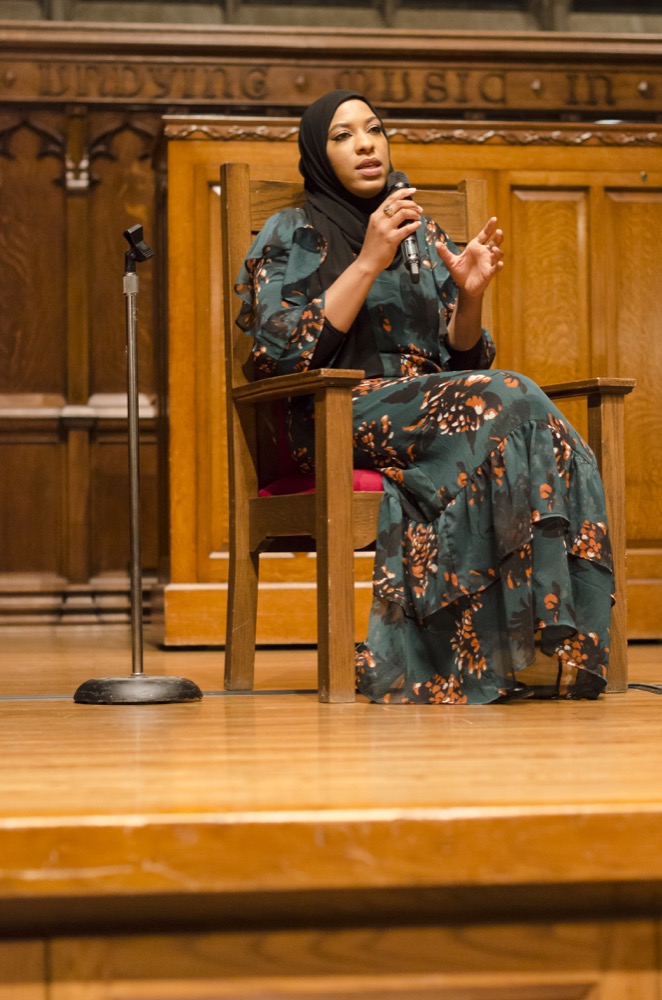Scene
An intimate chat with Ibtihaj Muhammad in Graham Chapel
Olympic-medalist fencer Ibtihaj Muhammad was honored at Glamour’s 2017 Woman of the Year Summit with a hijab-wearing, fencing Barbie doll made in her image on Monday, Nov. 13. The very next day, she graced Graham Chapel as the latest speaker in Student Union’s Trending Topics series.
From glitzy Hollywood fetes to Midwestern campus venues, Muhammad has gained fame in the past year and a half, starting with her qualifying for the United States’ Olympic women’s saber team in early 2016. Muhammad became the first Olympian to compete for the U.S. while wearing a hijab, a head covering that is worn by some Muslim women. She went on to earn a bronze medal in the team women’s saber event.
 Katie Ehrlich
Katie Ehrlich Olympic fencer Ibtihaj Muhammad spoke in Graham Chapel as part of Student Union’s Trending Topics speaker series on Tuesday. She detailed her journey to the olympics and her continued work in combating social issues.
Upon learning that she had qualified for the Olympics—and the “first” she would accomplish in doing so—Muhammad shared, “I realized in that moment that my dream was bigger than me.”
In addition to her boundary-breaking performance in the Olympics, Muhammad made headlines both during and after the international event for vocalizing her opinions on social issues, as well as the discrimination she has faced in her life and fencing career. She’s quickly become one of the most visible American Muslims in the media, not to mention a modern feminist icon. Her talk at Washington University—organized by the Muslim Students Association (MSA)—was eagerly anticipated by an enthusiastic, if small, group of people.
At Graham Chapel Tuesday, Muhammad spoke candidly and eloquently about her journey to fencing for Team USA. Growing up in New Jersey, Muhammad first began fencing at age 13 because it was one of the few sports whose uniform requirements didn’t conflict with her choice to dress modestly in accordance with her faith. She reflected on the sense of unity that a team’s uniform cements, appreciating that fencing was “hijabi-friendly.”
The athlete went on to attribute much of her success to her work ethic and dedication to the sport. For Washington University’s Fencing Club, which presented a strong turnout in the crowd, Muhammad’s emphasis on hard work and a positive outlook, rather than implying she had “natural” talents, was inspiring.
Sophomore Saima Choudhury, secretary for the MSA, also appreciated these remarks.
“I really hope that resonated with people, because I feel like at a school like Wash. U., people set very high standards for themselves. And maybe when they don’t meet those standards, they take it really personally and think that they themselves are failures, just because they experience failure,” said Choudhury. “So, I like how she talked about overcoming obstacles, and I hope that is something people remember.”
The majority of Muhammad’s remarks explored her intersecting identities, as a black, Muslim woman competing in a majority-white sport. She reflected on racism and discrimination that she’s experienced in settings as varied as an Enterprise Rent-A-Car counter and her own coaches’ behavior within the U.S. national team.
Sophomore Oyinkansola Adenekan, an executive member of the MSA, was especially receptive to this aspect of Muhammad’s talk, sharing her identity as a black Muslim woman.
“I think in general in media, Muslims aren’t depicted that much. And on top of that, if Muslims are depicted, they’re definitely not black. So, I think it’s really cool to have a really visible black Muslim figure,” she said.
Adenekan also appreciated Muhammad directly addressing discrimination within the Muslim community itself. “For me personally, when [discrimination] happens within communities that I belong to, like black communities or Muslim communities, that’s particularly hurtful,” Adenekan added. “I hope that’s something people can be aware of.”
Despite the additional hurdles she has had to face in her fencing career simply by virtue of her identity, Muhammad emphasized how much her conscious decision to choose happiness has shaped both her outlook and her outcomes. This approach certainly shines through in Muhammad’s new role as a public figure, even—especially—when she calls attention to situations that people may find uncomfortable.
“I’m not a whistleblower. I’m not here for attention; I’m here for inclusion and equality,” Muhammad said.
During a Q&A session with MSA Vice President and Wash. U. athlete Amal Haque, Muhammad talked about how meaningful it was to receive her personal Barbie doll. Barbie was an integral part of her own childhood, and she touchingly pointed out that now, girls wouldn’t have to make hijabs for their dolls, because hers would already be wearing one.
Muhammad also reflected on her experiences as a college student at Duke University, noting that Wash. U.’s campus reminded her of Duke’s. Choudhury welcomed this perspective.
“Everything she was saying was so relatable…And when she talked about how she tries to lead her life according to her faith, that connected with me a lot,” said Choudhury. “I like that she said a lot of things that a lot of people could connect to, not only me as a hijabi woman of color at Wash. U.”
As founder of her own clothing line, Louella, Muhammad’s style on stage was even more stunning than expected, as she stepped out wearing a dark green floral dress, black hijab and killer booties. Apparently, she was even kinder and more thoughtful (and fashionable) offstage, as well.
“When I was talking to Ibtihaj after the event, I told her how I admired her for being a visible hijabi woman of color doing great things for fashion and social justice, and she told me that I probably have a much bigger impact on other people than I realize, just as a hijabi on Wash. U.’s campus,” said Choudhury. “The idea that I, just as a student, could inspire people the way Ibtihaj does was really empowering.”
